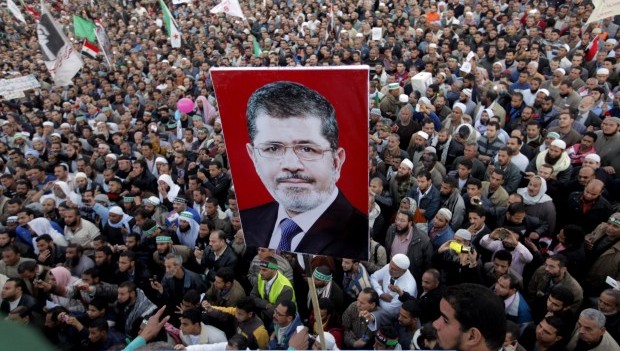
Thousands of Egyptian protesters shout slogans supporting Islamist President Mohammed Morsi, his poster at center, during a rally outside Cairo University in Cairo, Egypt, Friday, Feb. 15, 2013. AP Photo/Amr Nabil
Cairo, Asharq Al-Awsat—Egyptian President Mohamed Mursi called for parliamentary elections to begin on April 27 and finish in late June, as part of a four-stage vote that the embattled Islamist leader hopes will put an end to the country’s political crisis. The new parliament is set to convene on July 6.
According to Mursi’s presidential decree, the first stage of voting will take place in five provinces, including Cairo, on April 27 and 28, with a run-off scheduled for May 4 and 5.
The second stage will see eight provinces, including Giza and Alexandria, voting on May 15 and 16, with a run-off scheduled for a week later.
The third stage will see another eight provinces vote on June 2 and 3, with a run-off scheduled for June 9 and 10.
The final stage of the parliamentary elections will see Egypt’s remaining six provinces vote on June 19 and 20, with a run-off scheduled for June 26 and 27.
Mursi’s announcement comes after Egypt’s Shura Council adopted an electoral law that allowed for Mursi to set the date for the parliamentary elections.
Egypt’s Islamists hope that these elections will draw a line under the political and social problems being experienced by the country, particularly the ongoing protests and opposition that have grown to characterize Mursi’s presidency.
However it seems unlikely that the opposition National Salvation Front (NSF) will change its tune at this late stage. Mohamed ElBaradei commented on Mursi’s presidential decree on Friday, warning that the “decision to go for parliamentary elections amidst severe polarization and eroding state authority is a recipe for disaster.”
The Egyptian Popular Current, led by NSF member Hamdeen Sabahy went even further last week, calling for the resignation of the prime minister and threatening to boycott any forthcoming parliamentary elections, regardless of guarantees, in objection to Mursi’s “undemocratic regime.” The Nasserist also politician criticized Mursi’s rush to hold parliamentary elections, dubbing this an “attempt by the Muslim Brotherhood to again dominate parliament.”
He added, “The Brotherhood want to rush the elections because of its belief it will be able to secure a third of the seats under the current circumstances.”
